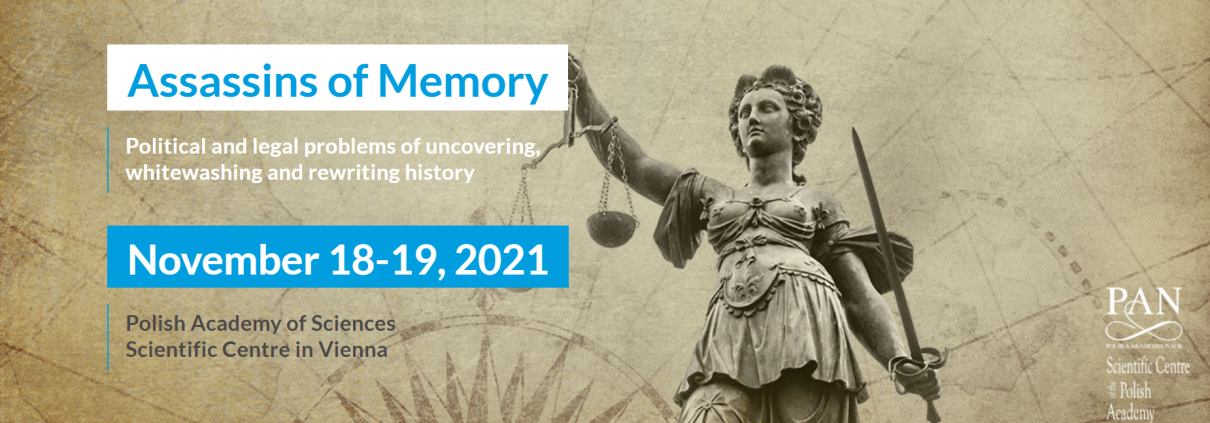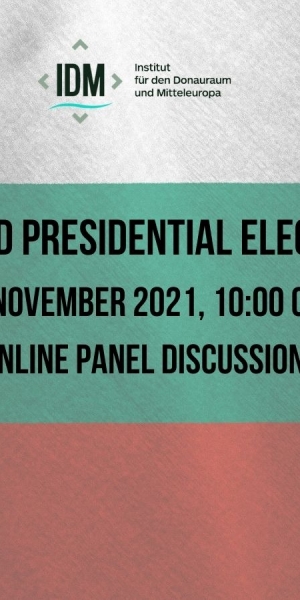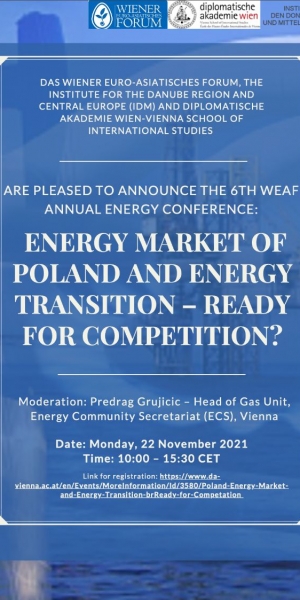Assassins of Memory. Political and legal problems of uncovering, whitewashing, and rewriting history
Date/Time
November 18, 2021
16:00 - 18:10 CEST/CET
The conference will provide philosophical, political and legal input to the discussion of politics of history and the broader aspect of memory as an essential part of political strategic planning. The problematic aspects of individual countries’ history and the politicians’ exploiting them in public discussion are part of a particularly heated debate in contemporary Europe, where facts have to face their public reinterpretation. The perception of history may be influenced by both the mental dimension – as an element of political discourse, and the legal dimension – like changes in law consolidating certain officially recognized states. These practices may influence the perception of history both positively (as preserving certain inviolable facts) and negatively (whitening the history, rewriting it, highlighting only selected elements). The issue of transitional justice will be at the centre of the discussion.
IDM is cooperation partner of this event.
AGENDA
ONLINE SESSION
18.11.2021
4.00 PM – 6.10 PM (CET)
Streaming:
FB: https://www.facebook.com/PANinWien
YT: https://bit.ly/3mVndFm
Chair: Dr. Sonia Horonziak (Polish Academy of Sciences – Scientific Centre in Vienna)
4.05 PM – 4.20 PM
• Prof. dr hab. Klaus Bachmann (SWPS University of Social Sciences and Humanities): Does genocide litigation distort historiography?
4.25 PM – 4:40 PM
• Dr George Soroka (Harvard University): What Authorities Say, What People Hear: Can Elites Shape Memory in Russia and Ukraine?
4.40 PM – 4.55 PM
• Klaus Rackwitz (International Nuremberg Principles Academy): Transitional Justice in Germany – change in perception and policy.
4.55 PM – 5.10 PM
• Ma. Rhea Gretchen A. Abuso (Xavier University in the Philippines): Laws of Remembering the Marcos Regime in the Philippines
5.10 PM – 5.25 PM
• Paula O’Donohoe (Complutense University of Madrid): The dispute over the street map. Reinterpretation of Spanish recent history in urban spaces.
5.25 PM – 5.40 PM
• Katalin Izsák-Somogyi (Pázmány Péter Catholic University, Budapest): Changing of the structure among the Hungarian memory laws after 1989
5.40 – 6.10 PM Discussion
ON-SITE SESSION
19.11.2021
9.30 AM – 4.15 PM (CET)
9.30 AM – 9.45 AM
• Prof. Arkadiusz Radwan (Polish Academy of Sciences – Scientific Centre in Vienna, Vytautas Magnus University): Opening address
Session I:
Memory law and transitional justice in contemporary Europe
09.45 AM – 10.00 AM
• Dr. Astrid Reisinger Coracini (the University of Vienna, University of Salzburg, Salzburg Law School on International Criminal Law, Humanitarian Law and Human Rights Law): A history writing function of the jurisprudence of international criminal courts and tribunals
10.00 AM – 10.15 AM
• Prof. Ireneusz Kamiński (Institute of Legal Studies, Polish Academy of Sciences, Jagiellonian University): The Strasbourg standard for forgotten and unsettled “historical crimes”
10.15 AM – 10.30 AM
• Dr Filip Cyuńczyk (SWPS University of Social Sciences and Humanities): Constitutionalized by the past: Central European approach to political communities re-creation (experience, influence, prospects for the future)
10.30 AM – 10.45 AM
• Dr. Claudia Kuretsidis-Haider (Documentation Centre of Austrian Resistance): The development of postwar justice and memory as tools of Transitional Justice in Austria from 1945 to the present time.
10.45 AM – 11.15 AM Discussion 11.15 AM – 11.30 AM – Coffee break
Session II:
Country reports – memory law from an insider position
11.30 AM – 11.45 AM
• Dr Tamás Hoffmann (Hungarian Academy of Sciences Centre of Excellence, Corvinus University of Budapest): Legacy of the Hungarian people’s tribunals and how the way their jurisprudence is invalidated: the issue of Hungarian Vorgangenheitsbewaeltigung.
11.45 AM – 12.00 PM
• Dr. Winfried R. Garscha (Documentation Centre of Austrian Resistance): Commemorate the dead between belittlement of crimes and damnatio memoriae World War II and Austrian politics of memory
12:00 PM – 12:15 PM
• Dr Francesco Trupia (Nicolaus Copernicus University, Torun): No Space to Grief: Recollecting the ‘Revival Process’ from Bulgaria’s Official Amnesia and the Forgetfulness of the European Memory Discourse
12.15 PM – 12.45 PM Discussion 12.45 PM – 1.30 PM – Lunch break
Session III:
How to fit in? The application of the memory law in individual cases
1.30 PM – 1.45 PM
• Dr Konrad Graczyk (University of Silesia in Katowice, Institute of National Remembrance):
The case of Ignacy Kaczmarek. About the German court murder in 1944 and settlements with the German occupation in Poland
1.45 PM – 2.00 PM
• Dr Sonia Horonziak (Polish Academy of Sciences – Scientific Centre in Vienna): Freedom of research vs. memory laws: a case of research publication of the “Dalej jest noc” book.
2.00 PM – 2.15 PM
• Dr Petra Švardová (Slovak Academy of Sciences): When monuments fall. The case of the communist-era monuments after 1989 in Czechoslovakia
2.15 PM – 2.45 PM Discussion 2.45 PM – 3.00 PM – Coffee break
Session IV:
Memory and the politics: rule of law vs rule of government
3.00 PM – 3.15 PM
• Prof. Gerry Simpson (The London School of Economics and Political Science):
Unprecedented: International law, history and the production of bathos 3.15 PM – 3.30 PM
• Dr Marina Bán (University of Copenhagen): The Legal Governance of Historical Memory and the Rule of Law
3.30 PM – 3.45 PM
• Assoc. Prof. Charis Papacharalambous (University of Cyprus, Goethe University):
Criminalizing assaults on memory. Between national mythology and post-truth
3.45 PM – 4.15 PM Discussion
For more information visit: https://lawandmemory.eu
- Beginn: Donnerstag, 18. November 2021, 16:00 Uhr
- Ende: Freitag, 19. November 2021, 16:15 Uhr
- Ort: Day 1: Online, Day 2: Polish Academy of Sciences – Scientific Centre in Vienna
- Adresse: 1030 Vienna, Boerhaavegasse 25
- Auskunft: Polish Academy of Sciences – Scientific Center in Vienna
- Auskunft E-Mail: sonia.horonziak@vienna.pan.pl
- Anmeldung: sonia.horonziak@vienna.pan.pl
Categories



